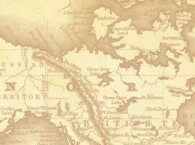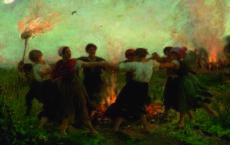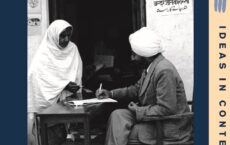
Beginning in the 1850s, the United States took its first, incautious steps toward developing an overseas empire in the Pacific. In the end, the empire would help defeat Japan during World War II. The bloodiest and most infamous battles of the Pacific War were fought on possessions gained by American imperialists. The first American shots […]
Read MoreAs I write this, England has had the wettest twelve months since 1871 (although it has seemingly been drier in Scotland, where I live – even if it does not necessarily feel that way). Weather stories, including those dealing with extreme weather, are increasingly a feature of our news cycles, as part of the ever […]
Read More“Not as bad as we might have feared; not as good as we might have hoped” is one way to think of the four years in which Donald Trump put his uniquely Trumpian spin on US-Korean relations. And lest we forget, there was reason to be afraid as President Trump taunted the young leader of […]
Read MoreThales of Miletus, in the 6th century BCE, asserted that “everything is full of gods”. In his view, even inanimate things were in fact animate. His vision of the world, taken up by Plato, implies the presence of an infinite number of divinities in the kosmos, which is also inhabited by human beings. The complexity […]
Read MoreAnyone who has ever watched the Six Nations in Rugby or the World Cup in Football probably is familiar with the sentiment of beating a neighbouring country or rival brings among the faithful. What these competitions show is how overcoming a detested neighbour in head-to-head contests can provide incomparable feelings of victory. Is this feeling […]
Read MoreBy exploring how athletic champions wanted their victories to be understood, “Hellenistic Athletes” sheds new light on the relationship of sport, society and politics in the Greek world. Read the full blog post by author Sebastian Scharff: A Gateway to the Mindsets of Greek Athletes The exclusion of Russian athletes from athletic contests is a […]
Read MoreWhen I tell anyone what I study, people (even sometimes other academics) think it’s weird, distasteful, or just arcane. If the Indigenous population of the Americas is often seen as an “other,” then Aztecs are the other of the other. In seeking to dispel that notion, I wrote A Concise History of the Aztecs to […]
Read MoreIn February 1946, the Indian nationalist leader Narendra Deva (1889-1956), who had just spent three long years being held in prison at Ahmednagar Fort by British authorities, published a short essay on the relationship between democracy and anti-colonialism in South Asia. A close associate of both M.K. Gandhi and Jawaharlal Nehru, Deva had a well-developed […]
Read MoreBeginning in the 1850s, the United States took its first, incautious steps toward developing an overseas empire in the Pacific. In the end, the empire would help defeat Japan during World War II. The bloodiest and most infamous battles of the Pacific War were fought on possessions gained by American imperialists. The first American shots […]
Read MoreAs I write this, England has had the wettest twelve months since 1871 (although it has seemingly been drier in Scotland, where I live – even if it does not necessarily feel that way). Weather stories, including those dealing with extreme weather, are increasingly a feature of our news cycles, as part of the ever […]
Read More“Not as bad as we might have feared; not as good as we might have hoped” is one way to think of the four years in which Donald Trump put his uniquely Trumpian spin on US-Korean relations. And lest we forget, there was reason to be afraid as President Trump taunted the young leader of […]
Read MoreThales of Miletus, in the 6th century BCE, asserted that “everything is full of gods”. In his view, even inanimate things were in fact animate. His vision of the world, taken up by Plato, implies the presence of an infinite number of divinities in the kosmos, which is also inhabited by human beings. The complexity […]
Read MoreAnyone who has ever watched the Six Nations in Rugby or the World Cup in Football probably is familiar with the sentiment of beating a neighbouring country or rival brings among the faithful. What these competitions show is how overcoming a detested neighbour in head-to-head contests can provide incomparable feelings of victory. Is this feeling […]
Read MoreBy exploring how athletic champions wanted their victories to be understood, “Hellenistic Athletes” sheds new light on the relationship of sport, society and politics in the Greek world. Read the full blog post by author Sebastian Scharff: A Gateway to the Mindsets of Greek Athletes The exclusion of Russian athletes from athletic contests is a […]
Read MoreWhen I tell anyone what I study, people (even sometimes other academics) think it’s weird, distasteful, or just arcane. If the Indigenous population of the Americas is often seen as an “other,” then Aztecs are the other of the other. In seeking to dispel that notion, I wrote A Concise History of the Aztecs to […]
Read MoreIn February 1946, the Indian nationalist leader Narendra Deva (1889-1956), who had just spent three long years being held in prison at Ahmednagar Fort by British authorities, published a short essay on the relationship between democracy and anti-colonialism in South Asia. A close associate of both M.K. Gandhi and Jawaharlal Nehru, Deva had a well-developed […]
Read MoreKeep up with the latest from Cambridge University Press on our social media accounts.
Spike Gibbs is Junior Professor for the Economic History of the Middle Ages at the University of Mannheim. His writing on manorial officials, felony forfeiture and managing stray animals has been published in journals such as the Journal of British Studies and the English Historical Review. This is his first book.
Salim Yaqub is Professor of History at the University of California, Santa Barbara and author of Winds of Hope, Storms of Discord (2022).
David Stefan Doddington is Senior Lecturer in American History at Cardiff University. He is the author of Contesting Slave Masculinity in the American South.
Milan Pajic is the Alexander von Humboldt postdoctoral fellow at Freie Universität Berlin. This is his first book.
Susan Stein-Roggenbuck is an Associate Professor of American social policy in James Madison College at Michigan State University. She is the author of Negotiating Relief: The Development of Social Welfare Programs in Depression-Era Michigan, 1930–1940 (2020).
Merry E. Wiesner-Hanks is Distinguished Professor of History Emerita at the University of Wisconsin-Milwaukee and an experienced textbook author.
Geoffrey Parker is Andreas Dorpalen Professor of European History and an associate of the Mershon Center at The Ohio State University. He has published forty books, and is the editor of The Cambridge History of Warfare and The Cambridge Illustrated History of Warfare
Simon Mitton is a Life Fellow at St Edmund\\\\\\\\\\\\\\\'s College, University of Cambridge. For more than fifty years he has passionately engaged in bringing discoveries in astronomy and cosmology to the general public. He is a Fellow of the Royal Historical Society, a former Vice-President of the Royal Astronomical Society, and a Fellow of the Geological Society. The International Astronomical Union designated asteroid 4027 as Minor Planet Mitton in recognition of his extensive outreach activity and that of Dr Jacqueline Mitton.
Australian Catholic University, Melbourne
University of the Fraser Valley
German Historical Institute, Washington DC
Marquette University, Wisconsin
Alice Tranah grew up in Cambridge and, after studying history at University, fell delightely into life as a bookseller, first in London and then here for Cambridge University Press Bookshop.
University of Oxford
Skidmore College
King\'s College London
Queen Mary University of London
Oberlin College, Ohio
University of Sydney
University of Sheffield
Katholieke Universiteit Leuven, Belgium
University of Bristol
University of Manchester
The Cambridge Guide to African American History
Slavery and Forced Migration in the Antebellum South
\\\'The Colored Hero\\\' of Harper\\\'s Ferry
London Lives
Playing Hesiod
The Cambridge Companion to American Civil Rights Literature
Magna Carta Third Edition
Magna Carta Third Edition
American Hippies
Dreams and Visions in the Early Middle Ages
The Most Controversial Decision
How the War Was Won
Nineteenth-Century American Literature and the Long Civil War
Magna Carta and Its Modern Legacy
Magna Carta, Religion and the Rule of Law
The Crisis of Global Modernity
The Politics of Heritage in Africa
The Taming of Democracy Assistance
Forging Rivals
The Long Process of Development
Justice in Asia and the Pacific Region, 1945-1952
Of Limits and Growth
Imagining Medieval English
French Colonial Soldiers in German Captivity during World War II
American Grand Strategy in the Mediterranean during World War II
Combat and Genocide on the Eastern Front
Visions Of Victory: The Hopes Of Eight World War II Leaders
Africa and World War II
Hiroshima
Reconstructing Sociology
Chopsticks
The Afterlife of the Roman City
She-Wolf: The Story of a Roman Icon
National Security and Core Values in American History
Michelangelo: The Artist, the Man, and His Times
Why Life Speeds Up As You Get Older
Dictionary of Irish Biography
Radicals in Their Own Time
Abortion Politics in Congress
Abortion Politics in Congress
Capitalism, For and Against
Capitalism, For and Against
Srebrenica in the Aftermath of Genocide
The Lure of the Arena
Antisemitism and the American Far Left
The Ecology of Oil
I Do Solemnly Swear
After Bush
After Bush
A Concise History of Sweden
Darfur and the Crime of Genocide
Darfur and the Crime of Genocide
The New Martin Gardner Mathematical Library
The Mind of Jihad
Global Brands
The Poetry of War
Doubt and Skepticism in Antiquity and the Renaissance
Cotton
Grape vs. Grain
A Revolution in Taste
A Government Out of Sight
The Horse in Human History
Samuel Johnson, the Ossian Fraud, and the Celtic Revival in Great Britain and Ireland
Sexual Politics in Modern Iran
A History of Modern Israel
Making a New Deal
Political Moderation in America\\\'s First Two Centuries
Liberty before Liberalism
Srebrenica in the Aftermath of Genocide
Japan Rising
Venice: History of the Floating City
Nazi Empire
A History of Communications
Library marketing associate
Being a Historian
The Origins of AIDS
The War of 1812
London: A Social and Cultural History, 1550–1750
Battling Pornography
The Spanish Civil War
The American 1930s
Operation Typhoon
Seduced by Secrets
The End of Straight Supremacy
A Short History of Ireland
The American Mission and the \\\\\\\'Evil Empire\\\\\\\'
Creating the Nazi Marketplace
The Treason Trial of Aaron Burr
The International Diplomacy of Israel’s Founders
Tested by Zion
London: A Social and Cultural History, 1550-1750
Does Your Family Make You Smarter?
Stephen A. Douglas and Antebellum Democracy
Beyond Combat
Senior Inbound Marketing Executive
The Humanist World of Renaissance Florence
An Age of Neutrals: Great Power Politics, 1815–1914
The Social Life of Hagiography in the Merovingian Kingdom
Developing Countries in the GATT Legal System
The First French Reformation
Behind the Front
The Fascists and the Jews of Italy
Ireland and the Irish in Interwar England
The Cambridge History of Magic and Witchcraft in the West
Twentieth-Century Spain
Magistracy and the Historiography of the Roman Republic
Text and Authority in the South African Nazaretha Church
Muslims of Medieval Latin Christendom, c.1050–1614
Climate Change and the Course of Global History
Law and Identity in Colonial South Asia
Constitutions in Authoritarian Regimes
Cambridge University Press Archivist
The People\'s Game
The International Distribution of News
Channelling Mobilities
The Short Story and the First World War
The American Army and the First World War
Gender and Race in Antebellum Popular Culture
The Cambridge Companion to Modernist Culture
A Divided Republic
Sir Edward Coke and the Reformation of the Laws
The Founders and the Idea of a National University
Roman Political Thought
New Centers of Global Evangelicalism in Latin America and Africa
The Politics of Gay Marriage in Latin America
Romantic Reformers and the Antislavery Struggle in the Civil War Era
Slavery, Race, and Conquest in the Tropics
Laura F. Edwards, Duke University, North Carolina Laura F. Edwards is the Peabody Family Professor of History at Duke University. Her book The People and Their Peace: Legal Culture and the Transformation of Inequality in the Post-Revolutionary South was awarded the American Historical Association\\\\\\\'s 2009 Littleton–Griswold Prize for the best book in law and society and the Southern Historical Association\\\\\\\'s Charles Sydnor Prize for the best book in Southern history.
Wine, Sugar, and the Making of Modern France
Ferdinand II, Counter-Reformation Emperor, 1578–1637
Sovereignty, Property and Empire, 1500–2000
British Naval Supremacy and Anglo-American Antagonisms, 1914–1930
The Cambridge History of Magic and Witchcraft in the West
Caricaturing Culture in India: Cartoons and History in the Modern World
1919, The Year of Racial Violence
Ovid and Hesiod
Reading and Writing during the Dissolution
Declaring War
A Concise History of the United States of America
Marketing intern
Publisher
German Immigrants, Race, and Citizenship in the Civil War Era
On Dissent
On Dissent
Assistant manager (e-products)
Wilhelm II
The Struggle for the Eurasian Borderlands
The Sierra Leone Special Court and Its Legacy
The Many Panics of 1837
No Exit from Pakistan
The Hammer of Witches
Ethnic Patriotism and the East African Revival
Eating and Ethics in Shakespeare\\\\\\\'s England
To receive updates on History & Classics news from Cambridge University Press and Fifteen Eighty Four, please join our email list below. We will not disclose your email address to any third party








